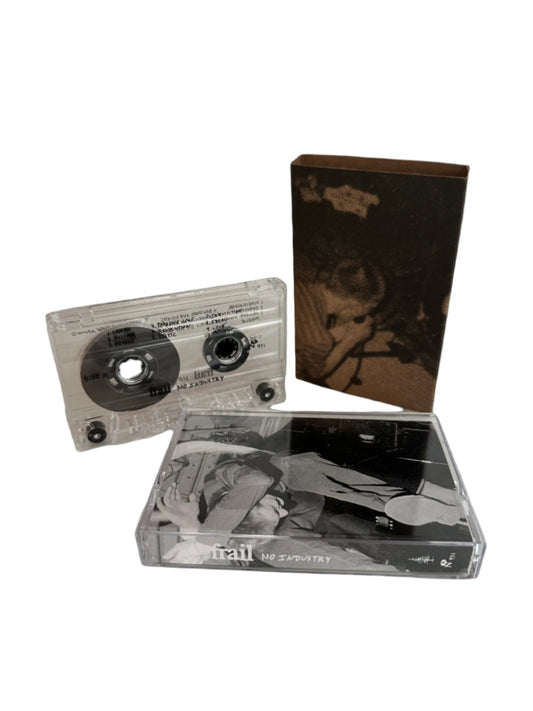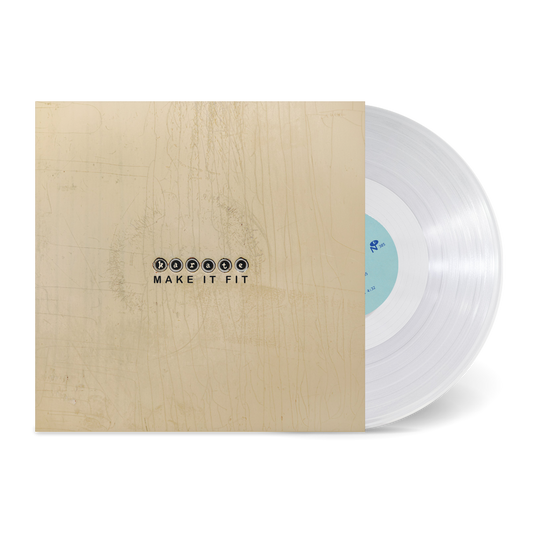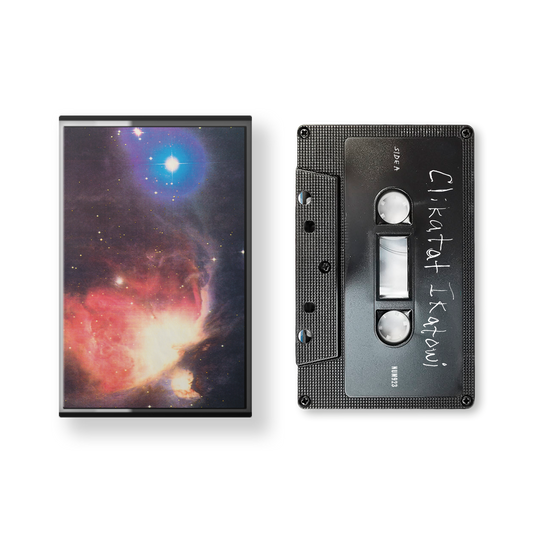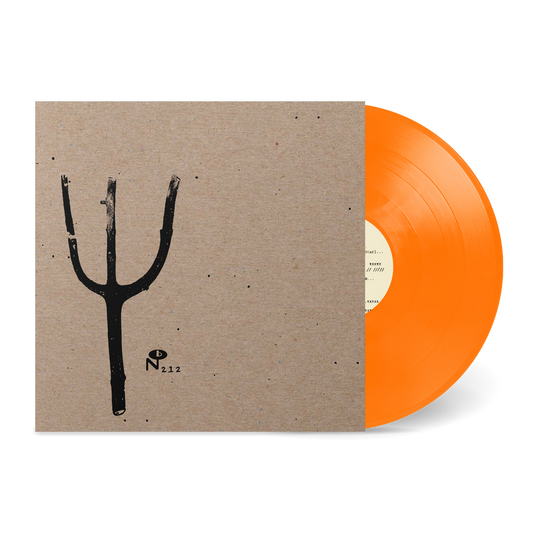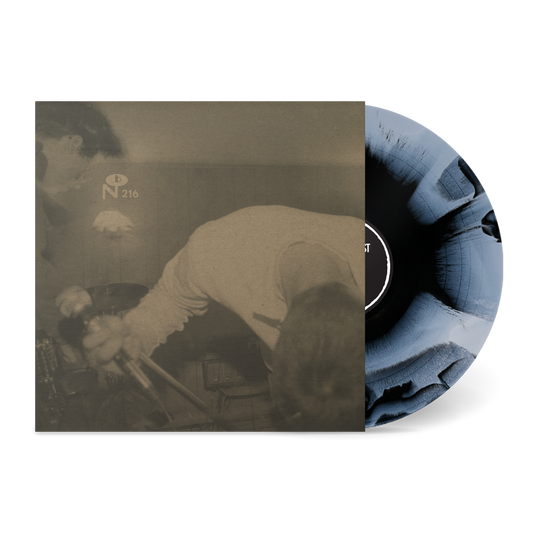Being a teenager in the American suburbs of the 1980s and ‘90s often meant that your ideals seemed to outpace your surroundings. By the early 1990s, as a generation came of age that was too young to have seen Black Flag or Minor Threat, straight edge had started to take a militant approach, drawing lines to keep out people who would not blindly follow some of the genre’s shifting ideals. Frail, a straight-edge hardcore band from Willow Grove, Pennsylvania, who were active from spring 1993 to fall 1995, was more focused on communicating ideas and inclusion; they wanted to teach as much as learn, and this duality meant their music was the perfect vehicle to release the tension of that new generation. Their lineup — Mike Parsell and Don Devore on guitars, Brian Berwind on drums, Derek Zglenski on bass, and Eric Hammar on vocals — released 20 songs, a discography spread across a lone demo tape and a handful of small runs of vinyl on various DIY punk labels, all long out of print.

About 15 miles north of Philadelphia’s City Hall, the town of Willow Grove is most known for the famed Willow Grove Park, which by the 1990s had been turned into the Willow Grove Mall. Not far from Upper Moreland High School, tucked behind a senior living estate complete with a man-made pond, are the quiet, hilly streets where Mike Parsell and Eric Hammar grew up. Here, Frail would get their start, develop their sound, and dissolve as quickly as they appeared. The band’s discography only stretches from their sophomore to senior years of high school, but during this time they challenged the masculine anger that had sprung from those first waves of punk and found a path demonstrating the freedom of being in a band with your best friends.
In 7th and 8th grade Mike was focused on punk rock, skateboarding, and his goal of being in a band. Eric and Mike, who became friends while waiting for the school bus, bonded over hardcore, straight edge, zines, and the discovery of DIY culture. “I got into a lot of music from skate videos, listening to Black Flag and the Descendants and stuff like that,” says Mike. “(We) were desperate to start a band, we wanted to make it happen so bad.”
The two started attending shows at the Fiesta Motor Lodge, a down-on-its-luck hotel where kids looking to book hardcore bands started putting on shows. There they saw touring acts like Lifetime and Resurrection as well as local hardcore bands. These shows helped them see a straight line to their own noise. And one night, they met a kindred spirit when a band called Abstain, whose drummer Brian Berwind was still in middle school, played the Fiesta.

“Before they played and the drums were all set up, before any bands had played, Brian got on the drums and started jamming,” says Mike. “We wrote to Abstain because we bought their demo and asked, ‘Who was that kid who was playing the drums?’ And they wrote in the mail back and gave us his phone number. Eric and I cold-called him and we were like, ‘Hey, we saw you playing drums, you want to come play drums for this band we are trying to start?’ And he was like, ‘Sure.’ He took the bus down and he came over and we wrote the first song on the demo, ‘Sold.’”
Brian grew up north of Willow Grove in the Doylestown area. He started playing drums when he was very young and took to the kit quickly. Soon after they finished their first song, with Mike on guitar and Eric on vocals, the band made their debut at a house party and played their only song, “Sold.” At that show they met Don Devore, who had grown up in Flourtown and was already playing in a band called Disregard. Don was already obsessed with the guitar, often coming home from school, plugging his guitar into the home stereo and playing until he fell asleep at night. He approached Brian, Mike, and Eric after they played. “He saw what we were trying to do and was able to work with us on that. It was a good fit,” Mike says. “Don was a pro through and through,” Brian says. “He came in with a full skeleton of the song, and being a creative drummer I ate that up. So having somebody musically intelligent like Don writing music was awesome because he already thought through a lot of the flow and changes so it made sense to him.”

The band started having regular practice in Mike’s basement bedroom, which had a separate entrance and allowed friends to come and go without disturbing his family upstairs. Mike often drove to Doylestown to pick up Brian, with a pit stop in Flourtown to get Don, before heading back to his place to rehearse. The Parsell house quickly became the band's home, and the noise coming from the bedroom could be heard for blocks, mixing in with the hum of the nearby turnpike, bomber runs out of the local airbase, and the Upper Moreland High School marching band playing at halftime.
But they needed a bass player.
Derek Zglenski had attended shows with Mike and Eric, who had made him some mixtapes. He was a newcomer to the hardcore that Frail was drawing inspiration from, but he took to it quickly. His bass playing was a combination of Peter Hook and Joe Lally that provided a foundation for the frantic guitars and vocals that would define Frail’s sound.
Don helped finish the arrangements of the first two Frail songs, “Sold” and “Rifle,” which they would soon record for their demo tape in July 1993 at Wildfire Studios, a spot the band found out about from another local band, Flagman. Frail had developed a songwriting process of music first, lyrics second. “Primarily the guys would write a song and practice it and refine it. I would tape it and bring it home and try and fit lyrics into it,” says Eric, who had started pulling from the deepest parts of himself for his delivery.
For most of the band this was their first time in a recording studio, an experience they met with the same naive energy they would with each new opportunity throughout their existence. “I didn’t know I could redo the songs if I make a mistake,” Brian says, “so we did it live and Eric went back and did the vocals.”
The band made between 30 and 50 self-released and individually dubbed copies to sell at local shows they either played or attended and trade with friends. Prior to the demo the band had only played a small number of local shows, including a performance in Eric’s backyard that was quickly shut down by the police after Frail played one song.

One area that initially bonded all of the members of Frail was their choice to identify as straight edge, which in its most basic terms is the choice to not drink or do drugs — to not dull the edge of experiencing life, good and bad. For Frail, though, it was an invitation to part of a larger community. “I liked the connection with the people and bands. It was unlike anything else to me,” says Brian. It was also a way to prolong adolescence.
“This was what it was for us: five kids together who could connect with other kids who wanted the space to be kids — riding bikes and skateboarding, making bands and arts and crafts, going to shows and playing playground games into our late teens,” says Eric. “By being straight edge, by building a box for myself, I prolonged my youth, extending my exuberant and curious joy a year or two longer.” Historically a lot of straight-edge bands used the label as a way to keep people out and remain closed minded. Frail stood against this. “I wanted to be open. I was OK with being wrong and figuring it out as I went. In turn, we found ourselves in a space that seemed our own,” says Eric. The band didn’t see straight edge as a barrier; it could just be a step toward making the personal into the political and vice versa.

Very early in their existence, Frail learned to put everything into their performance, jumping around and playing their instruments as intensely as possible for the time they had in front of their small crowds. And they played wherever they were asked: a VFW hall, skate parks, backyards, or the basement of a friend whose parents were out of town. They were also making new connections, like Steve Sakasitz of Yuletide records, who bought a copy of the band’s demo at a Shelter show and offered to release their first 7”.
“He sent us a letter in the mail: ‘Hey, I got your demo at this Shelter show, would you guys want to do a 7” on my record label?’” says Mike. “We were ecstatic, jumping up and down.” In 1994, this was the best mail-based encouragement that five 15- to 16-year-old kids could have hoped for.
Through the Springfield-area bands Fracture and Franklin, the band got the contact information for Chill Factor Studios. Frail spent the next three months working up four new songs to be recorded for the release. Playing live to tape was the only option available and affordable to the band, but it was also what they preferred, having honed a dynamic that relied on their collective energy. The restrictions aided the immediacy of the music, complete with missed notes, rocky fills and takes that felt great even if they weren’t perfectly executed. “The idea of overdubbing was a foreign concept,” says Don. “It was so dependent on what was happening in the room; it really depended on us going off each other.”
In the mid-1990s, before almost anyone could find out almost anything about almost anything they wanted to, DIY labels and zines were the main forms of messaging and distribution. When stalwart publications of the 1980s punk scene like Maximum Rocknroll and Flipside in essence shut their doors to the new hardcore scene, Ebullition Records, run by a former Maximum Rocknroll columnist named Kent McClard, and its zine HeartattaCk stepped in, unintentionally creating a blueprint for the next generation of bands on how to release records themselves. The records came packaged in covers that were often powerful in their simplicity, with additional inserts that explained the messages behind the music. Sharing information like this showed that there were scenes growing all over the country — doing it yourself did not have to mean doing it alone. “Zines were our Google,” says Don. Mike had seen Ebullition’s packaging and was looking for the same feel for the band’s first 7”. The image he chose — by an artist whose name he now admits he can’t recall — appeared by chance. “I was at the library at school looking through books and found that woodcut and it elicited something in me,” he says.



Yuletide released the single in the winter of 1994. Within a few months the initial pressing of 1,000 had sold out and the label was already repressing, eventually making a total run of 4,000 copies. Now the band had something to stand on, and they kept playing every show they were offered.
“We didn’t even know what the fuck headlining a show was; we would play anywhere in any order,” says Brian. “If a band needed gear we lent it to them. We would play ahead of them if their guitar player couldn’t make it; it was a community.”
Sometimes they stayed local, but they often drove to Vermont or Ohio on weekends, always making sure they were back home for school on Monday.
“It was always a struggle to figure out how to get there,” says Mike, who remembers traveling in a friend’s parents’ pickup truck. “We played a show in West Virginia and three people had to ride in the back of the truck, laying on top of the equipment. After we got back, my mom was like, ‘This isn’t going to work.’ My mom’s really cool. She loved this whole thing and is such a supporter and she went and bought me that van for like $600. My dad was so pissed.”

They named the van Shifty for its proclivity to change lanes without notice. The van would become their sanctuary, their curse, and the catalyst for all things Frail. If you could count on Shifty for one thing, it was that it would break down. After playing at Cornell University one winter weekend, they were driving back through a snowstorm and Mike felt the gas pedal go all the way to the floor while the van slowed down. It was a Sunday, so when they were towed to the closest garage, it was closed.
“But the owner comes, talks to us and says, ‘Your throttle cable broke and I can’t get one anytime soon.’ But we have to get back for school. We’re in high school, and we’re still four hours away. And the guy’s son is there, and he is like, ‘I know what you can do, you can take the engine cover off from inside the van and someone can just reach in and control the throttle and someone else can steer and do the brakes,” Mike says. “So we are driving back with the engine cover off, but it is snowing and snow is blowing into the van, and the guys in the back are in their sleeping bags covered in snow, freezing. It was just insane, but we made it home and we were back for school.”
“We were such a wimpy group, but we might wind up very bloody on the floor at the end of a show,” says Don. “It was such a commitment to the moment.”
Eric became more comfortable at shows, discussing the meaning behind the songs’ lyrics. He started debates within the crowds, confronting the aggressive personalities that equated hardcore and straight edge with violence. And his physicality matched the intensity of the music. He would often jump, lifting his knees up to his chin and slamming his body down on the floor, writhing and screaming on his landing. When the mic broke he would cup his hands and keep screaming.

People started to listen. The crowds of teenagers would crowd in as the band began to set up. Before the first note was played, the tension in the room was noticeable. And as the band's level of comfort at shows was increasing, their bonds with each other continued to grow after hours and hours of practice, van rides, and tour mishaps.
“I remember playing in Rhode Island with Converge, who were awesome. We played this show and then we were supposed to stay with someone, and we went back to their apartment to sleep the night and we got followed by cops and they basically said we had to leave Rhode Island,” says Eric. “It was one of my favorite shows but the worst ending. We played the gig and thought we were going to go eat spaghetti and get some sleep [but instead] had to drive home.”
“We loved each other, we had so much fun hanging out. We were always together, it was a nice purpose,” says Mike. “We were definitely very idealistic.”
Frail got another break when Chokehold asked them to play four shows on their summer tour in 1994. The oldest member of Frail at the time was Mike, who was still only 16. It was a struggle to convince everyone’s parents to let them go on tour, but the band agreed to do the East Coast dates, taking them as far south as Florida. Derek was unable to convince his parents, so Mike took over on bass for the run of shows. Brian also had issues with his parents but chose another route.
“I always had to run away from home when I went on tour. I have an older brother, Chris, who I would tell where I was,” says Brian. “Then he would tell my mom I was going in the other direction, so if I was going to Florida he would say I was on my way to Maine.”
One of the things Frail loved about hardcore was correspondence. Through their individual zines, the 7” on Yuletide and the shows they attended and played, the band started to build their own direct connection with fans and peers. Their next opportunity came when James Spooner, aka Razzle, from Kidney Room Records in New York City, wrote to the band stating his desire to release their next batch of songs. Spooner was behind Earthwell, an organization described as pro-choice, pro-gay, pro-feminist, vegan, drug-free and nonviolent. It was meant to be a path toward progressive politics for people who wanted more than a physical release from the music.
“We were the same age but he was much more worldly, living on the lower East Side in a punk squat, which was very different from our world at that time,” Mike remembers. Spooner invited the band to the city and exposed them to the punk scene, which included the legendary DIY venue ABC No Rio. It may have been intimidating at first to kids used to more makeshift suburban shows, but it showed them what a successful group could accomplish within the scene. Mike started making regular trips after school to New York City to hang with Spooner, who became a constant guest at the Parsell house and at Frail shows.



Frail stood out in many ways in the scene, but one of the most important differences between them and other bands was their dedication to conversation with the audience. The band made patches that featured slogans like "start a revolution, don't kill one." Another patch had a design of two figures seated across from each other with the word "communicate" at the bottom. A Frail set might include only four to five songs, with the rest of the set devoted to Eric's desire to share and question the crowd. The band saw their purpose at shows as engagement, not just entertainment. This was not always an easy thing: some shows featured crowds who had been exposed to a more commercial, MTV-curated version of punk that had a greater focus on aggression and slam dancing. At one show in York, Pennsylvania, the band taped an American flag to the wall behind them with the words "when questioning stops, domination begins." These stances caused some audiences to dismiss them as "smart core," but others became more devoted to their songs and ethos.
The next step for Frail was the “Idle Hands” 7”, which represented a musical leap for the band. The songs were darker, the themes were more refined, and the instrumental performances showcased the payoff from all the live shows. The release featured five new songs, packaged in a manila envelope with a zine that featured lyrics and an essay written by Spooner. The initial press of 1,500 copies of “Idle Hands” was released in the fall of 1994 and sold out within a few months, eventually being repressed for another 1,500.




At the beginning of the 1994-1995 school year, four of the five members of Frail were in their senior year of high school. The band played out of town almost every weekend and started writing/recording with the goal of releasing another 7” for Kidney Room, but Spooner decided he didn’t have the energy to keep up with the workload of running the label. The band contacted Scott Biben at Bloodlink Records out of Philadelphia, who agreed to take on the next release, “New Harmony,” which suffered major delays in production.
Over the winter, the band worked with their new connections in the Princeton, New Jersey, scene and recorded a split 7” with close friends Elements of Need. These would be the last two songs the band recorded. Lyrically and musically, they were reflecting on the last four years of their lives, with their graduations a couple months away. They were so active that everyone would bemoan a weekend without a show — but they hadn’t played locally in almost a year.
In the spring of 1995, Frail was asked to play a benefit show for Cinekid, a local youth program that focused on educating teens in audio and video production. Everyone in Willow Grove knew the place, as it was located across the street from the high school, but few of them had ever been there. Eric was asked by a classmate, who knew he played in a band but had never heard Frail, if his band would be interested in playing the show. It was a chance to play to their friends, classmates, and curious neighbors who had never seen anything like a Frail show before.

The purpose of the show was to create a concert film that the Cinekid students would shoot and edit together and sell to raise money for their program. Mixed in with the crowd of teenagers in attendance were adults with professional-quality video cameras. On stage, friends were welcomed to crowd in behind the amps. The band opened with “Static” and the room exploded, maybe even more so than a normal Frail show. More than moshing, the environment was controlled by chaos and jubilation.
Us trying to break down any barrier between a member of the band and the audience — playing on the floor was always the preferable option. Eric would have sermons about breaking down that barrier.
It was clear that almost everyone at the show who had never heard Frail was perplexed and unprepared. Midway through the set, Eric landed an acrobatic jump, slamming down so hard on the riser stage that it collapsed under his feet, sending amps and other band members onto the floor. The Cinekid staff, mistaking the destruction as intentional, shut the show down, locked the doors, and confronted the band about “destroying the stage and monitor equipment.” The venue assumed incorrectly that the band purposefully kicked in monitors and broke the stage, and the classmate who set the show up confronted Eric afterwards and said he was going to sue the band for $2,000. But for many in the crowd, the show was as powerful as the Sex Pistols playing Lesser Free Trade Hall. From that show the Midiron Blast Shaft, Aspera, Creepoid, and many other bands were inspired to start making their own music.
“That was indicative of the perfect show, the explosion from the kids, then the man came down on us. And we broke the stage,” Don says. “Us trying to break down any barrier between a member of the band and the audience — playing on the floor was always the preferable option. Eric would have sermons about breaking down that barrier.”
As the spring turned to summer the majority of Frail graduated from high school and prepared for a national tour with Spirit Assembly. They were in good form, despite not having a concrete plan for what would happen to the band in the fall. “The tour we went on after school, there could literally be a movie about it, some coming-of-age movie,” says Don. “I think for seven to 10 days on that tour I didn’t have shoes, I was so broke. We would always go pool hopping on tour, and the cops came and we had to run off and I left my shoes. I don’t think we even had debit cards, we were just out there.”




During the tour, Kent McClard from Ebullition Records attended a couple of the shows and asked the band to release an LP on the label. The band went hiking with McClard and hung out at the Ebullition office, seeing firsthand how the label they admired from afar operated. Frail looked up to McClard and was enamored with his organization, professionalism, and kindness. “He was like our hero, the things he said and the way he wrote,” Mike says. “The whole scene and vibe was so nice, I loved it so much. Then he asked to do a LP and I was so excited to do it.” This was a highlight of the tour for the band: the institution that most represented their ideals was now asking them to be on their label. The next night the band played 924 Gilman Street in Berkeley, California, with Fifteen before making their way to Seattle and then back east through Montana, Chicago, and finally Ohio, where they unknowingly played their last show.
On the West Coast leg of the tour the band decided to get Frail tattoos, with Mike being the lone holdout. Being straight edge for Mike had become restricting. After a couple years of being on the same page with politics, music, and aesthetics, the band reached a fork in the road regarding the limitations that the genre could put on their music and their identities. Mike’s relationship with Spooner continued to open his eyes to those limitations. “If you need straight edge to not do drugs you have bigger problems than not doing drugs,” says Spooner. “That clicked for Mike, but not for some of the other guys.”
“Part of growing up is growing apart. When we started the band we were entirely different kids to where we ended,” Eric says. “This evolution of thought toward straight edge was the end of Frail. We were too immature and too shortsighted to actually resolve this philosophical conflict and everything collapsed in on itself.”
The band ended without much confrontation, and everyone just moved on to what was next. For Mike and Don that meant touring with their new band, Mandela Strike Force. Eric left for college, Derek had one more year of high school to finish, and Brian went home to process the last few years and think about what to do after Frail.
The bond that the band members experienced — hours in the van together growing up — was magnified by those late years of adolescence. This seems to be the most important legacy to the band members. In a sense, it was a good place to end things; it kept Frail tied always to the purity of youth.



“New Harmony,” the band’s final release, came out on Bloodlink in the fall of 1995. For many fans, it contains the band’s strongest songs. Recording at Snugfit Studios for $160, Frail continued to track live with minimal overdubs. “Firecracker” leads off the record with an iconic bass intro, breaking into a verse that is less chugging and more angular. For every jump forward musically, the band made a point to return to the roots of hardcore, with breakdowns leading to intense vocal builds and explosive drums. For Eric, the release summed up what he felt the band’s essence was. “I thought we were going to change the straight edge scene into this expansive space where ideas and art were shared freely and openly, without judgment, with an open mind and empathetic heart,” he says. “I really wanted it to be a place where I could change others and be changed — new harmony.”
What I wanted didn’t require anything more than being open and kind to yourself and others.
Looking back close to 30 years later, it is clear that the members of Frail still recognize the impact the band had on their lives. The lessons learned still stick with them, and the unanswered questions still motivate. “I eventually came to the understanding that labeling ourselves straight edge was more exclusive than inclusive,” Eric says. “What I wanted didn’t require anything more than being open and kind to yourself and others.”
That can be a tough lesson for anyone to learn, let alone a group of teenagers, but it is one that struck a chord with listeners, as well as the next generation of bands who claim Frail as an influence. It is also found in those who feel the sudden urge to create, to ask questions and to accept there is still more to learn. It is the sound of making your own noise.
-Written by Justin Myer and Andy Maddox (Haul Magazine), copy edited by Finn Cohen.















